- Home
- Ben Counter
Seventh Retribution Page 5
Seventh Retribution Read online
Page 5
‘Who are you?’ Orfos said.
‘I might… I might ask the same,’ said the nobleman, but any defiance in his words was nothing compared to the shaking of his voice.
‘Your city will fall. It will happen soon. You were ready to flee it as soon as the first attacks came. What makes you too valuable to leave in Khezal?’
‘You have no idea,’ said the nobleman. ‘No idea what we are.’
‘So talk,’ replied Orfos. The barrel of his bolt pistol never wavered, aimed right between the nobleman’s eyes.
‘We’re the same as you,’ the nobleman said. ‘We are but pawns.’
Orfos saw the man’s good hand wasn’t just holding his ruined arm. The fingers were working at his belt. The grenade’s pin pinged off just as Orfos realised what he was doing, and began to move.
Orfos leapt clear and the grenade in the nobleman’s hand went off. The man disappeared in a burst of shrapnel and dust. Clods of earth and pieces of armour pattered down over Orfos as the detonation died down in his ears.
‘Filth and damnation,’ hissed Vonretz. ‘We would have broken him.’
‘And he probably guessed the same,’ replied Orfos.
‘He won’t tell us anything more,’ said Geryius, ‘but these have a few things to say.’ He was kneeling over one of the troopers, tilting the dead man’s visored head. ‘They’re not Aristeia troops.’
‘Are you hurt, brother?’ said Orfos.
‘My pride is mortally wounded,’ replied Geryius. ‘The rest of me has no complaints.’
‘Then what do you think?’
‘I think,’ said Geryius, ‘that our exploding friend might not have had much choice about his escort or where he was going. They weren’t his household soldiers, that’s for sure.’ Geryius pulled the helmet off the dead man’s head. The cropped hair and cranial scars underneath did not seem to suggest the grandly uniformed men of the Aristeia. Geryius picked photoactive lenses from the corpse’s eyes. Quite possibly, the soldier had not removed his visor for a very long time.
‘No rank or regiment symbols,’ said Orfos. ‘And these are the scars from cortical grafting. Opis does not have such technology freely available, certainly not for anyone not of noble blood. I do not think this man is a native of Opis.’
‘On Malacios Tertius,’ said Geryius, ‘our Chapter fought with the Third Menandrian Crusade. The Inquisition sent their own troops. An inquisitor’s personal regiment. They had been mind-wiped so often they weren’t men any more. They didn’t have names or memories. They were programmed as soldiers and nothing more. This man reminds me of them.’
‘It was the Inquisition that brought this crusade down upon Opis,’ said Orfos, ‘after Kekrops’s death. For their troops to be fighting alongside the Aristeia makes no sense.’
‘You speak as if there is but one Inquisition, and its members are all of one mind,’ said Vonretz. ‘I may not be long a battle-brother, but even I know that is not the case.’
‘Bag up a corpse and bring it with us,’ said Orfos. ‘Geryius, you take to the air so readily I think you can do with the extra weight. Sling it over the back of your bike.’
‘Yes, sergeant,’ said Geryius.
‘More rats will be fleeing this decaying craft,’ continued Orfos. ‘They will bring with them whatever they cannot bear to be captured. That is reason enough to capture it. Saddle up, brethren. The eyes of our Chapter must never close.’
Scout Squad Orfos jumped back onto their bikes, checking their fuel loads and refreshing the ammo belts for their front-mounted bolters. Then, as the sun began to dip behind the smoking skyline of Khezal, five plumes of dust streaked across the Battle Plains again.
K-Day, K-Hour
Operation Requiem: Invasion of Khezal
Khezal had always held firm against invasions from the ground and the sea. Enormous armies of siege engines and cavalry, condemned prisoners loaded with explosives and tamed warbeasts, had pounded at the walls and were repulsed.
Huge siege-fleets, spraying naphtha fire and volleys of rockets, had sailed into its harbour and been sunk by cannon or snagged on underwater defences to be boarded and scuttled. A few hulks still lay in the harbour, slowly decaying, as a reminder of how Khezal had endured. But those attacks had been few and always disastrous – attempts by despots, sick of seeing their armies hurled back from the walls and buried in their thousands on the Battle Plains. Three times such attacks had come from the one-time naval superpower of the Dvolian Coil, whose Navarchs had lost army after army trying to reduce Khezal by land; with the failure of each a new dynasty had taken over the lordship of the Coil. Another attack came from the mad traitor Locasis, who had led a cabal of rogue geniuses whose masterful weapons nevertheless foundered against the rocks flanking the harbour, or crumbled under fire from the dockyard batteries. In these modern times, when Khezal’s ruling caste had expanded to rule the whole planet as the Aristeia, there was never any danger of anything coming from the sea.
The defences were there, but they were still designed with a view to dissuading a renegade city-state or the treacherous forces in a civil war. Any significant military invasion, anything from off-world, would be by land, with a force assembling among the foothills and then advancing across the Battle Plains.
And so, with a few well-led strikes against the coastal guns and sensorium arrays, the seaward defences of Khezal were all but paralysed. Imperial Guard storm troopers blew up missile silos and radar stations. A gunship assault from the Imperial Fists toppled a sensorium tower whose vast dish took in readings from across the seaboard, blinding the gun batteries that flanked the entrance to the harbour.
In the confusion of the multiple assaults on the city, few of the Aristeia paid much attention to the explosions coming from offshore. They were, in fact, the result of operations by sapper platoons of the Hektaon Lowlanders, planting demolition charges among the rocks of the jagged spurs forming the walls of the city’s natural harbour. The narrow entrance was the biggest hindrance to a fleet trying to enter the harbour by force, but the sappers blew channels in the spits of rock wide enough for smaller troop ships to force their way through. A natural defence of the city was suddenly rendered completely porous, and the few who realised it struggled to make their voices heard as the defence guns fell silent.
K-Hour arrived. Transport craft loomed down from orbit a few kilometres out to sea, flying low enough to drop the ocean-going Imperial Guard craft they carried. Three large ships, the size of the Merciless, bristling with guns to serve as floating gun batteries. The sections to assemble two enormous floating docks for repair and resupply. Fuel tankers. A hospital ship. And hundreds of troop transports.
The men of the 91st, 120th and 309th Deucalian Lancers. The Lord Sorteliger’s Own Regiment of Foot. The Gathalamor 912th Light Infantry and the Kirgallan Heavy Grenadiers. The remnants of the Hektaon Lowlanders, the 122nd Storm Troopers Division and the Luthermak Deathworlders, joining their fellow troops already fighting in the city. Almost fifty thousand men, and seventy-five tanks of the 4th Plaudis Shock Army. An army of the Imperial Guard the equal of any force the Aristeia of Opis could muster. The hammer of the Emperor, wielded with overkill force to shatter Khezal so completely that for light years around no world would question the authority of the Imperium for centuries.
The ships advanced towards the harbour. The few guns still operating around the harbour and along the coast opened up, fat whistling shells falling into the waves. The darkness was just starting to lift, with a grey dawn emerging from beyond the highlands to the west of the city, and the light found the sloping front ramps of the troop ships and the support gunboats weaving between them.
The Penitent’s Due and the Glorious headed straight for the harbour entrance. Their guns fired a few ranging shots, tracers that cast a harsh red glow over the quays and shipyards, the enormous dry docks and the industrial piles that made up the dockside quarter of Khezal. Then the fire began, the guns booming curtains of fire down onto
the docks.
The din was appalling. The Imperial Guardsmen gritted their teeth as the reports buffeted their craft. Almost half of them aimed for the channels blown in the harbour walls, and the rocks scraped against their hulls as they navigated the newly made narrows. Some foundered, and were dragged clear or pushed through, or clogged up their channel completely, stranding thousands of men. The first made it through to be greeted by the sight of the dockyards’ burning buildings collapsing into the sea, in scarcely better repair than the rotting hulks of ancient shipwrecks.
Thousands of men forced a beachhead onto the ruins of Khezal’s docks. The Plaudian tanks were floated onto the quays and the guns of the Glorious and the Penitent’s Due now sighted on the residential districts just inland from the docks, dropping shells to topple buildings and clog the roads inwards with rubble. The Aristeia’s troops would be kept from retaliating and throwing the Imperial Guard back into the sea.
The refugees numbered in the millions. They streamed out of the city, all vehicles soon abandoned in huge pile-ups as the people left them and headed westwards on foot. Panic spread faster than the fires dotting the eastern cityscape.
They had to get out. Not just because of the guns and bayonets of the Imperial Guard, the cannon of their tanks or the shells falling down from the battleships at sea. They knew what would happen to them if they stayed. Even if they could not give it a name, or describe exactly what form it would take, they knew. They had known for a long time.
The lords of Khezal, those who cowed the Aristeia in fear and majesty, emerged from their cabals and lairs, from the ancestral tombs they had infested and the regal spires given to them in tribute. They demanded an army. Those who did not kneel and take up arms would be changed into whatever the lords of Khezal needed. The people of Khezal fled in such numbers that streets were crammed with them, clambering over one another to get away from a fate they feared to imagine.
‘I have the square sighted,’ said Brother Gorgythion. Through the viewscreen of the gunship he could make out, through the plumes of black smoke and the palls of dust, a city square bounded on all sides by the ravaged buildings of Khezal. A couple of hours ago it had been one of the more upmarket places to live, separated from the fleshpots near the docks by a canal that acted like a moat against the city’s poverty. Grand columned frontages looked down on a square of elegant tiled mosaics, watched over by dozens of equestrian statues of Aristeia generals and rulers. One magnificent spire rose at the south-west corner of the square, almost twice as high as anything else nearby, crowned with leonine heads and flying the flag of several lesser houses of the Aristeia.
The artillery barrage had not been kind to the place. Several statues lay toppled from their plinths, only the broken bronze feet of their horses remaining in place. Craters had been blown in the square and many of the buildings around it had been blasted open, spilling the rubble and twisted metalwork of their entrails over the mosaics. Many more were on fire, belching black smoke from their windows.
‘No contacts,’ said Gorgythion. Beside him his co-pilot, Kebriones, rapidly switched through readouts on the cogitator console in front of him. The chatter from several vox-channels chittered tinnily from the cockpit vox-casters, rising and falling as Kebriones sifted through the controlled bedlam of battle in the city below.
‘Guard to the south-east,’ said Kebriones. ‘Should be in visual soon.’
Gorgythion banked the gunship, circling the square.
‘Still nothing,’ said Gorgythion, peering among the rubble and the scorched facades of the gutted buildings.
‘They are there,’ said Kebriones. ‘Everything we know says Khezal will fight.’
Gorgythion focused on a retinal icon and brought up the weapons status, projected onto the inside of the viewscreen. In the cramped cockpit, everything was edged with the pale green and winking red of the weapons readouts.
The Shadowhawk had started out its life as a Thunderhawk gunship, used to transport the Space Marines of the Imperial Fists and provide them with air support once they were on the ground. But the Chapter armoury had transformed it into something very different – the Shadowhawk, based on some of the oldest Standard Template Construct fragments ever recovered by the tech-priests of Mars, was a dedicated weapons platform, its passenger compartment sacrificed to house the craft’s missile batteries and ammunition stores. The readout confirmed a full missile load, targeting array and autocannon on-line, countermeasures loaded and ready to deploy.
The Chapter had christened her the Sanctifier.
‘There they are,’ said Kebriones. In the south-east corner of the square could be seen a trio of tanks advancing, wearing the blue and gold colours of the 4th Plaudis Shock Army. They were equipped with dozer blades that forced through the rubble, all the artillery barrage had left of the streets east of the square. Alongside them walked a couple of hundred men of the Imperial Guard, their grey camo body armour marking them out as Kirgallan Heavy Grenadiers. At this height Gorgythion could make out the heavy weapons teams hauling wheeled heavy bolters and lascannon, as the grenadier units swept the empty windows and doorways around them with their lasguns.
‘Sanctifier here, we see you,’ said Kebriones.
<
<
‘Still clear,’ voxed Gorgythion. ‘Report contacts.’
‘Getting reports on both flanks,’ said Kebriones. The pict-screens were cycling through vox-frequencies, the voices of the various Guard vox-operators appearing as juddering, jagged crimson lines on the screens. ‘Doesn’t seem organised. Militia and household troops. They’re running or being mown down.’
Down below, the Kirgallans were walking across the square, into the open. They clung to the cover provided by fallen masonry and statues, their old soldier’s instincts automatically steering them away from the open. The lead tank rode up over a fallen statue, treads grinding down through the torso of a bronze horse.
‘Wait,’ said Gorgythion. Almost without registering on his mind, movement had scuttled across the corner of his vision. Even a Space Marine, whose peripheral vision was among the many senses augmented by his transformation into a battle-brother, could easily have missed it. Gorgythion had been a pilot, attached to the Chapter’s armoury and Techmarines, since he had been recruited by the Imperial Fists. He saw everything on the ground. He had the eyes of a bird of prey.
Gorgythion looked closer at the buildings along the square’s north edge. He was certain he had seen something – someone – moving there, perhaps in a window or a doorway.
A body lay, surrounded by crimson spattered across the paving slabs, at the foot of one of the buildings. Many had died in the first bombardments, and many had no doubt been blown from the windows or chosen to jump to escape the fires still smouldering in many of the buildings.
But this body was still bleeding. Crimson was spreading behind it.
‘Be advised on the ground,’ voxed Gorgythion, ‘I see possible contacts to your north.’
<
Gorgythion saw the body fall this time. From an upper window it tumbled, thrown some distance as if thrown from the window. Or as if it had jumped.
Because it was not dead. It – she, Gorgythion saw, a woman going by the long hair that streamed out behind her – windmilled her arms and kicked her legs as she fell. She wore a forge worker’s uniform, dirty dark-green coveralls with a sash in the colour of whatever noble house owned the rights to her labour. She hit the ground hard enough to force her body out of shape, landing feet-first, her lower body forced up into her torso.
And another. A clerk, in the white toga of the underlings who kept the ledgers in Aristeia counting-houses. Then more forge and factorium workers. Beggars in rags. A periwigged le
gal scholar, robed academics from one of Khezal’s competing universities. Men and women. Old and young. Rich and poor.
<
‘No Imperial forces there,’ said Kebriones.
‘Then they’re not running from us,’ said Gorgythion.
Twenty had fallen. Thirty. Forty. The building was a high-end residential block, its view of the square and lavish style putting it well out of reach for commoners with anything but the highest status in Khezal. Far beyond the forge workers and street people leaping now from its windows.
A hundred. More. Two hundred, piling up beneath the windows. Blood thickened, spreading across the northern edge of the square as corpses thumped wetly onto corpses.
Gorgythion brought the Sanctifier down low, targeting oculi playing across the buildings along the northern edge. The Sanctifier’s instruments could see in the thermal spectrum, which in other circumstances could pick out the body heat of enemies lying in wait – but the smouldering fires blinded it, creating just blooms of incoherent light.
‘Throne knows what these heathens were told about us,’ said Kebriones, ‘if this is what they choose instead of submitting to their Imperium.’
‘I don’t think that is why they are dying,’ replied Gorgythion.
The last few bodies fell. The blood was thick and wet, mingling with the masonry dust in the square into a sluggish purple-black mass.
‘What do you mean?’ said Kebriones.
‘I think it’s a sacrifice,’ replied Gorgythion. He opened the vox-channel to the ground. ‘Sanctifier here. Potential moral threat. Moral threat to your north.’
<
‘Something that needs blood,’ replied Gorgythion.

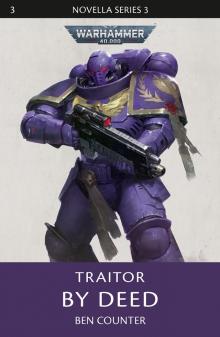 Traitor by Deed
Traitor by Deed Sacrifice
Sacrifice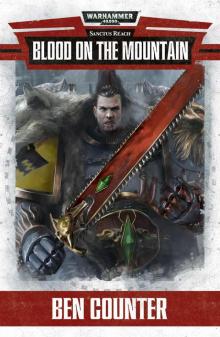 Blood on the Mountain
Blood on the Mountain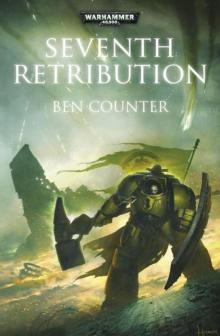 Seventh Retribution
Seventh Retribution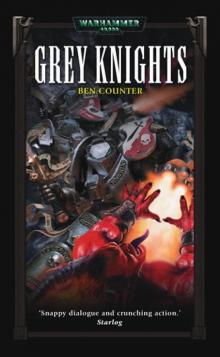 Grey Knights (Warhammer 40000)
Grey Knights (Warhammer 40000)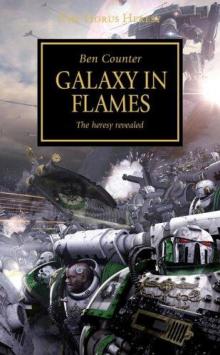 Galaxy in Flames
Galaxy in Flames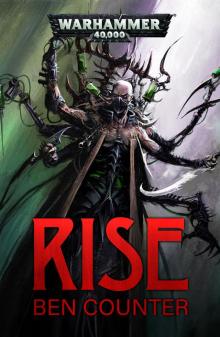 Rise – Ben Counter
Rise – Ben Counter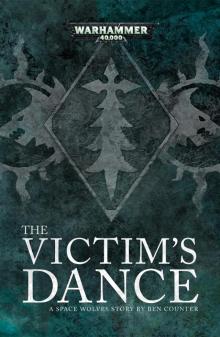 The Victim's Dance
The Victim's Dance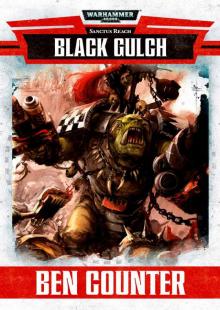 Black Gulch
Black Gulch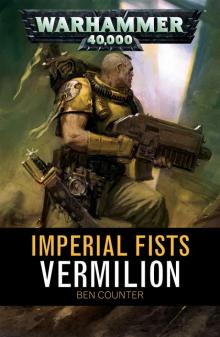 Vermilion
Vermilion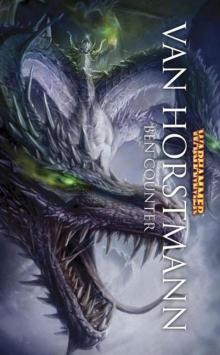 Van Horstmann
Van Horstmann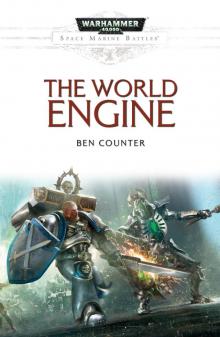 The World Engine
The World Engine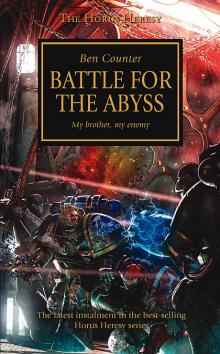 Battle for the Abyss
Battle for the Abyss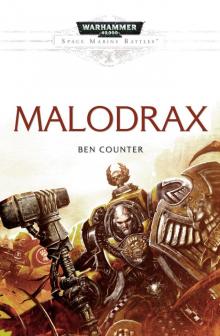 Malodrax
Malodrax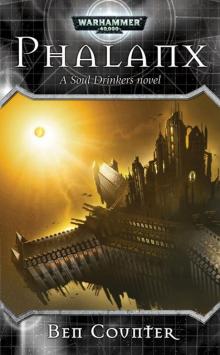 Soul Drinkers 06 - Phalanx
Soul Drinkers 06 - Phalanx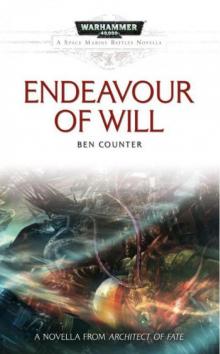 Endeavour of Will
Endeavour of Will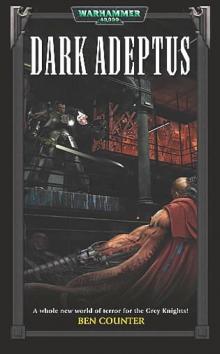 Dark Adeptus
Dark Adeptus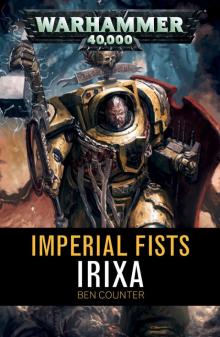 Irixa
Irixa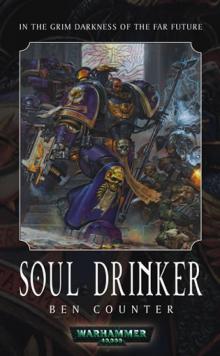 Soul Drinker
Soul Drinker